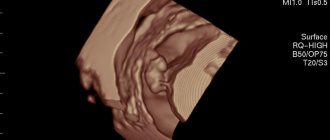First ultrasound. A diagnosed fertilized egg of 4-5 weeks must have certain indicators, size and correct location.
A woman is truly the adornment of our planet, and pregnancy makes her even more beautiful. Of course, a desired and long-awaited pregnancy is the most significant event in the life of every woman.
It is with the appearance of the first signs of pregnancy that many women make a lot of efforts to find out as early as possible that her dream is coming true, in the literal sense of the word.
The first signs most often appear at 4-5 weeks of pregnancy, at this moment the first delay of menstruation occurs, and a pregnancy test is almost 100% guaranteed to show the correct result.
After receiving positive results of an express pregnancy test, experts recommend immediately contacting an antenatal clinic, where the expectant mother will be under medical supervision for another eight months.
To exclude an ectopic pregnancy, most often the doctor prescribes the first ultrasound examination of the uterus. The most accurate method is a transvaginal examination, which is performed by inserting a sensor into the vagina to determine the location of the fertilized egg (in the uterine cavity, or outside its cavity, which may indicate an ectopic pregnancy).
Sometimes a transabdominal examination is performed, which is performed through the anterior wall of the lower abdominal cavity to determine the thickening or compaction in the walls of the uterus, which is typical for pregnancy.
The first ultrasound examination determines the number of fetuses, SVD (average internal diameter) of the ovum, CTR (coccygeal-parietal size) of the embryo and the exact gestational age. At a period of 4–5 weeks, the size of the fertilized egg reaches from 18 mm to 40 mm (average internal diameter).
What's happening
Now the body of the embryo is C-shaped, but you can already visually determine where the head, arms, legs, tummy, back and butt will be.
At the 5th week of pregnancy, the upper respiratory tract and heart of the little person begin to form. And already from the middle of this week, the tiny heart is slowly starting to work. At first the contractions will be irregular, but after three days the heartbeat will become rhythmic.
At this stage, the first blood cells are formed, blood vessels gradually form, and the liver and pancreas begin to form.
Also, at the 5th week of pregnancy, the middle section of the neural tube partially closes. This will later develop into your baby's central nervous system, so it is important to continue taking folic acid daily.
During this week, the skeleton, urinary system and intestines begin to form.
Development of the fertilized egg at 4-5 weeks of pregnancy
In the fourth week, the fertilized egg takes on an elongated shape and increases in volume. The embryo takes on a curved shape, tiny processes are already visible, which will later turn into legs and arms. At 4-5 weeks of pregnancy, the fertilized egg occupies the entire uterine cavity and doubles in size with each subsequent week.
In the interval of 4-5 weeks, the size of the ovum on average can reach 18 mm, and the embryo itself has a size of 0.4-1 mm (coccygeal-parietal size). The embryo is connected to the fertilized egg by a germinal cord, from which the umbilical cord will develop in the future. On an ultrasound, you can already see the heartbeat and the rudiments of organs that will develop in the future.
A 4-5 week fertilized egg, or rather the embryo itself, consists of two layers: ectoderm and mesoderm. The ectoderm will in the future form the brain and spinal cord, peripheral nerves, tooth enamel and epidermis. The cartilaginous and bone skeleton, excretory and reproductive systems, blood vessels, and skin are formed from the mesoderm.
Upon reaching a full 5 weeks, the size of the fertilized egg reaches an average of 40 mm, and the length of the embryo averages 1.5 mm-3 mm. This week, the embryo forms another layer - endoderm. The endoderm in the future will become the intestinal mucosa and associated glands (pancreas, liver, etc.)
It should be remembered that when receiving the results of an ultrasound examination, first of all you need to pay attention to the diagnosis, and not to the indicators that the ovum has at 4-5 weeks (CTE of the embryo and SVD of the gestational sac). These indicators vary depending on many factors; if a specialist does not indicate the presence of anomalies or pathologies, then you should not look for them there.
Nausea
It usually appears in the morning, and may intensify during the day. In some women, nausea becomes so severe that it progresses to the stage of uncontrollable vomiting. To date, there are no 100% effective remedies for this unpleasant condition. And to ensure that toxicosis ruins your life as little as possible, try following a few recommendations:
- Eat more often, but in small portions;
- Avoid foods with unpleasant odors;
- Eat foods high in protein;
- To avoid dehydration, drink enough fluids;
- Rest often;
- Avoid stressful situations.
Nutrition at 5 weeks of pregnancy
If you haven’t planned a pregnancy and haven’t thought about your diet before, now it’s simply necessary to do so. Nutrition during pregnancy should be balanced and enriched with healthy vitamins and microelements. Avoid junk food (such as fast food). Enrich your diet with dairy products, vegetables and fruits.
To minimize the discomfort from early toxicosis, doctors advise, when you wake up, not to get out of bed abruptly, but to lie down for a while and eat cookies or nuts. Try replacing meat products and eggs with legumes, limit your consumption of fatty and fried foods, and sweets. Green tea with lemon, rosehip infusion, and cranberry juice help well with toxicosis. To avoid a feeling of fullness in the stomach, you should drink in small sips.
Risk factors
If you are bothered by constant nagging pain in the lower abdomen, similar to what you felt on the eve of your period, this may indicate increased tone of the uterus. However, sometimes these symptoms are associated with intestinal dysfunction - in this case, they appear after squeezing the abdomen or prolonged sitting. Discuss the problem with your doctor: if it is truly related to digestion, the specialist will prescribe a safe antispasmodic and help you create the right diet.
But when a brownish-bloody “smear”, heavy bleeding or discharge with clots is added to the pulling abdomen, there is a possibility that a spontaneous abortion has occurred. The reasons for a miscarriage can be very different: from a common cold (a temperature of 38 degrees and above is very dangerous) to some abnormalities in the development of the embryo.
In addition, at the 5th week, a frozen pregnancy is possible, when the embryo stops developing and dies in the womb. In this case, weak bloody discharge appears, and pain is felt in the abdomen. To establish the fact of a frozen pregnancy, it is necessary to do an ultrasound.
Also at this time, some women develop herpetic rashes on the mucous membranes of the lips. If this is not the first time you have had such rashes, at the moment herpes is not dangerous for the fetus: your unborn child will be protected by your immune system.
Lifestyle
The period is still very short, but the embryo is already becoming dependent on the emotional state and lifestyle of the expectant mother. Therefore, a woman should not be nervous! You need to try to be calmer and not worry about trifles. Stop drinking alcohol, smoking, and avoid contact with sick people. And surround yourself with beautiful objects! So, in the East it is believed that a pregnant woman must look at something beautiful - then she will certainly give birth to not only a healthy, but also a very cute baby.
Nutrition
The main rule for the 5th week of pregnancy is to eat whatever you want, but without overeating. The best option is frequent and small meals. Even if there is no appetite, you still need to eat, because your baby needs nutrients. Try to eat what is least disgusting right now. The feeling of nausea may disappear from a product that you like, and real hunger will wake up instead. And don’t forget that the diet should be balanced and not just consist of new food cravings.
During this period it is recommended to avoid:
- Raw shellfish;
- Pates;
- Raw eggs;
- Unpasteurized milk;
- Meat that has not undergone heat treatment;
- Soft cheeses (Camembert, Brie, Roquefort, Feta, etc.).
Body changes and new sensations for women
All new changes and sensations signal the onset of an “interesting situation.” "I am pregnant!" - a woman exclaims (often with surprise) without waiting for her period to start. The absence of menstruation is the most obvious and reliable sign of pregnancy, which every representative of the fair sex knows about. Signs of pregnancy in the early stages may also be the following: nausea (especially in the morning), increased sensitivity to various odors, fatigue, drowsiness, enlargement and engorgement of the mammary glands, increased basal body temperature, changes in appetite and taste preferences, unreasonable mood swings, increase in hCG concentration.
Medical observation
The 5th week is the very period when there are reasons to suspect that you are pregnant. This means you will need medical supervision.
If you become pregnant while taking oral contraceptives, be sure to tell your doctor. Are you still not sure about your “interesting position”? Stop taking the pills anyway and go to the gynecologist.
Pregnancy that occurs with an intrauterine device often ends in miscarriage. Visit your doctor as soon as possible to have the IUD removed immediately.
Ultrasound is usually not done at 5 weeks. However, if it is necessary to confirm the “diagnosis” or exclude the possibility of an ectopic pregnancy, an unscheduled ultrasound is performed. An ultrasound examination will show how many fetuses are developing in the mother’s womb and where exactly they are implanted. The specialist will also assess the condition of the uterus. So far, neither the weight nor the expected gender of the unborn child can be determined: your baby is still too small. But by the end of the 5th week of pregnancy, you will be able to hear your baby’s heart and even see it beating on the screen.
Vitamins
The ideal option is when the doctor leading the pregnancy advises the woman what to take during the 5th week of pregnancy and in what quantity (an individual approach is still important in this matter!). We will note the importance of only some vitamins in week 5. Thus, it is known that every second pregnant woman experiences a deficiency of folic acid, an essential element for the formation of the baby’s organs and systems (primarily, we are talking about the nervous system). Folic acid is essential during pregnancy! In addition to special tablets, it is found in spinach, asparagus, carrots, peaches, avocados, beans, hazelnuts, dark rye flour, eggs, liver and cheese.
For the correct formation of the embryo, an uninterrupted “supply” of B vitamins to the body is required (these are cereals, legumes, apricots, carrots, beets), vitamin C (black currants, sea buckthorn, cabbage, strawberries), as well as iodine and magnesium (seaweed, bananas).
Fifth week of pregnancy: how you feel
Every pregnancy is unique, but here are some of the symptoms you may experience during your fifth week of pregnancy:
- Nausea.
During the fifth week, some pregnant women begin to experience nausea. Unpleasant sensations can occur in the mornings, evenings and throughout the day, and some women even experience bouts of vomiting. To alleviate the condition, drinking plenty of fluids is recommended. Attacks of nausea can be triggered by fatty, spicy or too rich foods, so in this case, split meals with regular snacks are recommended.
- Minor bleeding.
In the fifth week of pregnancy, spotting is possible, but normally there is no heavy bleeding - just a few drops of blood, which can be retained by a thin panty liner. This is how implantation bleeding manifests itself, but if the bleeding is heavy, you need to inform your doctor about it in order to prevent possible complications. Consult a doctor immediately if there is heavy bleeding, pain in the lower abdomen or any other complaints.
- Breast tenderness.
In the fifth week of pregnancy, rising hormone levels may cause tenderness in your breasts, which are expanding in size to prepare for breastfeeding.
- Frequent urination.
The amount of blood circulating in your body increases, along with the amount of fluid your kidneys have to process, so you may need to go to the toilet more often. This is a completely normal phenomenon, although not always comfortable.
- Fatigue.
Don't be surprised if you constantly feel like you've been squeezed out of a lemon. The body gets used to increased levels of progesterone, hence the feeling of fatigue. To get better sleep, try not to drink coffee or caffeinated drinks at night and refrain from vigorous activity. Try to stick to a certain routine, but don't overdo it. While going about your daily activities, do not forget about rest. Don't blame yourself if you want to lie down or sleep during the day. A good rest will only benefit you and your baby.
- Mood swings.
First you smile, and a minute later you cry - is this a familiar feeling? Mood swings occur in many pregnant women. For some women, it's like PMS at its peak. Try to distract yourself if a bad mood prevents you from leading a normal life - take a walk or listen to your favorite music.
- Acne.
The cause of acne during pregnancy is hormonal changes. Tips from our article on acne during pregnancy will help you cope with rashes. And don’t forget that acne during pregnancy is only a temporary discomfort that you will most likely forget about soon after giving birth.
- Symptoms are mild or non-existent.
What to do when no symptoms appear in the fifth week of pregnancy? At this stage, many women feel and look the same as usual, or some symptoms pass quickly. In the fifth week of pregnancy, the belly is either not visible at all, or it is noticeable and bloating is felt. With severe toxicosis, you can even lose weight during the first trimester of pregnancy. Be sure to consult your doctor if you have the slightest concern about existing or absent symptoms.
If this is not your first pregnancy, read about the differences in symptoms typical between your first and second pregnancies.
Leading specialists in the management of complex pregnancies in the Southern Federal District
Ermolaeva Elvira Kadirovna is a well-known and recognized specialist in the North Caucasus in the field of diagnosis and treatment of miscarriage, miscarriage, recurrent miscarriage, management of pregnant women with thrombophilia, antiphospholipid syndrome (APS), systemic lupus erythematosus (SLE), uterine fibroids, management of pregnancy in young and older pregnant women (after 38 years), management of capricious pregnant women, management of overweight pregnant women. A good obstetrician-gynecologist, a specialist in rational nutrition during pregnancy, a physiotherapist-resortologist, an experienced ultrasound doctor. Women who want to maintain their figure and successfully carry a pregnancy to term.
Ermolaev Oleg Yurievich Candidate of Medical Sciences, gynecologist-endocrinologist with 25 years of experience and successful experience in managing pregnancy in women with uterine prolapse, bicornuate uterus, saddle uterus and other malformations of the genital organs, managing pregnant women with livedo, thrombophilia and antiphospholipid syndrome (APS) , polycystic ovary syndrome. Management of multiple pregnancies, which require special attention and experience from doctors. Management of pregnancy after IVF, ICSI, after artificial insemination. Management of pregnant women with placental insufficiency. Management of pregnancy against the background of an IUD.
About the doctors of the Clinic in detail...
INTERNATIONAL RECOGNITION of the reputation and achievements of the Women's Health Resort Clinic in the development and implementation of effective and safe treatment methods and the quality of medical services provided is the AWARDING of the Women's Health Resort Clinic in Pyatigorsk with the SIQS International QUALITY CERTIFICATE in the field of medicine and healthcare. International Socratic Committee, Oxford, UK and Swiss Institute for Quality Standards, Zurich, SWITZERLAND. Read more…
Our Pregnancy Clinic is attended by a good obstetrician-gynecologist who specializes in proper nutrition during pregnancy.
A SPECIALIST IN PROPER NUTRITION during pregnancy WILL SELECT for you the necessary vitamins, HEALTHY FOODS during pregnancy, which will prevent you and your baby from gaining excess weight, and will help organize tasty and NOT HUNGRY FOOD during the trimesters of pregnancy.
In addition, our experienced nutritionist during pregnancy will CALCULATE for you the possibility of eating SWEET during pregnancy that is safe for your figure and will tell you in detail WHAT NOT TO EAT during pregnancy and how to balance foods that are prohibited by public opinion during pregnancy. But the ones you really want!!!
Based on foreign and Russian experience, we have DEVELOPED and successfully time-tested a NUTRITION SYSTEM that allows you to select products during pregnancy depending on the INDIVIDUAL characteristics of a pregnant woman: her build, taste preferences, body weight and height, sex of the fetus and external features...
The pregnancy clinic in Pyatigorsk is open seven days a week and on holidays:
Monday - Friday from 8.00 to 20.00, Saturday - Sunday from 8.00 to 17.00.
Appointment with an obstetrician-gynecologist who specializes in proper nutrition during pregnancy, ultrasound of early pregnancy and screening during pregnancy by appointment by multi-channel phone number 8 (toll-free within Russia), or (for foreign calls).
ONLINE gynecologist in Pyatigorsk can be found at
BOOK ONLINE for an appointment with a gynecologist in Pyatigorsk here.
Doctors and midwives of the Pregnancy Clinics are ALWAYS READY for patients registered for pregnancy in our Clinic, if it is impossible to contact them in person, to comment on an existing or newly emerging situation by phone and SUGGEST ways to solve it.
The obstetricians-gynecologists of the Women's Health Resort Clinic have accumulated EXTENSIVE EXPERIENCE in successful and joyful pregnancy management. We love pregnant women!
Journal of Emotions
Send us your emotions that arose during pregnancy. We will launch them into space!
- I ate wooden peaches without taste or smell. And I liked it! I also took it with me to work.
- Yesterday I enjoyed eating fish. And today just remembering her makes me sick.
- Cottage cheese, which I adored, didn’t suit me today!
- When I found out that God had rewarded me, such a wave of joy came over me! Every day I touch my stomach and feel like the Chosen One, the Priestess of life!!!
- The first 2 weeks of the delay were scary: suddenly the fading would happen again. Then I started feeling sick, and I calmed down.
- Cost of pregnancy counseling
- Fetal sensory abilities
- Conscious Conception
- Thoughts and emotions
- 5-6 weeks pregnant
- 7-8 weeks pregnant
- 12 weeks pregnant
- 15-16 weeks of pregnancy
- 20 weeks pregnant
- 24-25 weeks of pregnancy
- 28 weeks pregnant
- 30 weeks pregnant
- 32 weeks pregnant
- 34 weeks pregnant
- 36-38 weeks of pregnancy
- Pregnancy ultrasound photo gallery
It is possible and it is not possible
Activity in the fifth week of pregnancy
The 5th obstetric week of pregnancy is a period of important changes and processes affecting the development of the embryo. It is recommended to follow the rules to create optimal conditions for the future baby:
- Walk a lot in the fresh air. It is ideal if a woman finds time for a daily walk in the park, near a pond, or to go out into nature. If you have the opportunity to choose, it is better to give preference to leisurely walks on foot;
- Eat healthy. If the expectant mother works, then instead of a bun or other high-calorie and unhealthy dish, it is recommended to take nuts and fruit with you, and try to eat soup every day for lunch;
- Sleep well. Sleep during this period is very important; the body needs a lot of strength. It is necessary to rest at least 8 hours at night, if possible, rest during the day;
- Avoid stress and strenuous physical activity. It’s good if you can relate more simply to what’s happening around you and look at the obstacles that arise philosophically;
- Do not smoke and avoid smoky places. Active and passive smoking have a negative impact on the development of the unborn baby. Carbon dioxide and carcinogens in tobacco smoke are absorbed by the body faster than oxygen. Therefore, harmful substances replace it, which negatively affects the health of the baby;
- Try not to visit crowded places and avoid contact with sick people. It’s good if you can replace a trip on public transport with a walk, explain to your sick friend why you won’t be able to visit her. If contact with a sick person is inevitable, it is recommended to try to minimize it, not to use shared cutlery, and to ventilate the room well;
- You can start training your thigh muscles using the Kegel technique. Alternately tensing and relaxing the muscles of the pelvis and hips will prepare the body for future childbirth, reduce discomfort during pregnancy, improve the production of pregnancy hormones, and improve mood.
Prohibited for a pregnant woman in the 5th obstetric week of pregnancy:
- Alcohol;
- Fast food, smoked meats, fried, highly salted and seasoned, sushi and rolls with raw fish;
- Taking any medications not approved by a doctor;
- Strong tea and coffee;
- A large amount of chocolate, sweets, white baked goods;
- Difficult physical activity.
Approved medications
In the fifth week, continue to take folic acid in the doses prescribed by the gynecologist. If you need to take medications to maintain your health on a temporary or permanent basis, you should consult your doctor. Taking medications during pregnancy is prescribed only when the benefits of taking them are absolutely necessary and the possible consequences for the baby are minimized.
Sex
Intimate life in most cases is not prohibited in the 5th obstetric week of pregnancy. The main condition is the mutual desire of the partners. If discomfort or pain occurs during contact, you should consult a gynecologist.
If there are signs of a possible pregnancy failure, bleeding, or severe pain, it is recommended to avoid sexual contact.
Fifth week of pregnancy: What to discuss with your doctor
As a rule, you need to see a gynecologist approximately every month during pregnancy. During the last two months, examinations may occur more frequently. An appointment with your gynecologist is a great opportunity to ask questions and share concerns.
- Find out about possible complications due to health conditions, age or heredity.
- Find out what to do if there is minor bleeding at this stage.
- What kind of discharge during pregnancy is considered normal?
- Find out how often you should see a gynecologist.
- How far along are you now and what is your planned due date?
Pregnancy management after IVF
Proper gestational support reduces the likelihood of spontaneous abortion and abnormal fetal development. To prevent complications, it is advisable to be observed by specialists at the clinic where the IVF procedure was performed within 6-8 weeks after conception.
During the first trimester of pregnancy, patients should undergo regular blood tests to determine the level of:
- human chorionic gonadotropin;
- estrogen;
- progesterone.
A low concentration of steroid hormones is the basis for corrective hormonal therapy. It should be understood that an ordinary obstetrician-gynecologist in the antenatal clinic does not have sufficient experience in managing patients who have undergone IVF. If the risk of miscarriage increases, the fertility specialist will recommend undergoing additional examination or hospitalization.
Recommendations for expectant mothers
A pregnant woman needs fresh air. She needs daily walks of at least one hour. It is best to walk away from busy avenues, in parks, forest parks or in the garden. Walking strengthens muscles, speeds up blood circulation and brings great benefits to the expectant mother and child.
During pregnancy you need to take a special vitamin and mineral complex. It will ensure the normal health of the pregnant woman and the development of the baby. If the mother has a calcium deficiency, the fetus will take this microelement from her bones and teeth. To avoid this, you must take the necessary vitamin complex for pregnant women.
To maintain the required level of iron in the blood, you should take medications that contain this trace element.
It is best if a woman starts taking vitamins before conception, which will create ideal conditions for the development of the child.
The expectant mother needs to change her menu. It is better for her to include foods containing proteins, carbohydrates and vegetable fats in her diet. A woman should not consume chocolate, honey and citrus fruits so that the baby’s immune system develops normally.
Expectant mothers should control their weight. Over the entire period, body weight should not increase by more than 8-12 kg. If the weight increases rapidly, the woman's blood circulation will become difficult, which can cause serious consequences for the health and development of the child.
The expectant mother needs to perform a set of breathing and strengthening exercises. They help strengthen muscles:
- peritoneum;
- hips;
- crotch.
Throughout pregnancy, a woman should be observed by a gynecologist. She must undergo ultrasound at least 3 times. At any stage of pregnancy, this method of examination will accurately determine what is happening to the baby and mother. A woman must constantly undergo tests to monitor the level of hemoglobin, sugar and other indicators, and check the body for hidden infections that can negatively affect the development of the fetus.
Pregnant women need to avoid stress.
Soon you will become parents!
“Congratulations, you are now parents!”
This is a phrase moms and dads are likely to hear after their baby is born. Everything seems logical, because parents are those who gave birth to someone. But representatives of modern science and spiritual practitioners increasingly say that a person’s destiny begins to take shape... with the thought of conception! Not to mention the period when a flesh and blood creature begins to develop from the father and mother cells. Therefore, if you are planning a child or if he, a very tiny one, already really exists, then consider yourself parents. Getting used to the new role, you will be able to tune in to the Baby and, when his turn comes to be born, you will be much stronger, wiser and more responsible than mothers and fathers, for whom the previous 9 months were just a period of pregnancy. How would your Little One answer the question of what kind of person he would like his parents to be? Surely - loving and tender, caring and friendly, responsible and cheerful, smart, healthy and beautiful. Why? Yes, simply because all these qualities are a condition for its full development both before the moment of birth and in all subsequent years.
Good to know
Critical periods of embryonic development
Bring this - I don’t know what... Change in taste during pregnancy
What pregnant women should not do: myths and truth
Early toxicosis: survival instructions
How to overcome toxicosis? Acupressure and exercises for nausea during pregnancy
Toxicosis during pregnancy: what to do if you feel sick again?
Fighting toxicosis with folk remedies: personal experience of pregnant women
The first weeks of pregnancy: what to eat and drink for toxicosis, heartburn, constipation
What is toxicosis?
All texts for pages about mother and baby were kindly provided by RAMA Publishing - these are chapters from the book by Svetlana Klaas “Your Favorite Little Man from Conception to Birth”, reviewer Irina Nikolaevna Kononova, Candidate of Medical Sciences, Associate Professor of the Department of Obstetrics and Gynecology of the Ural State Medical Academy (Ekaterinburg).










